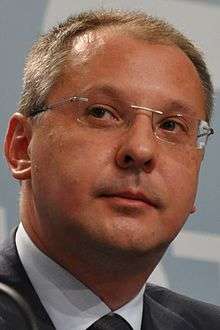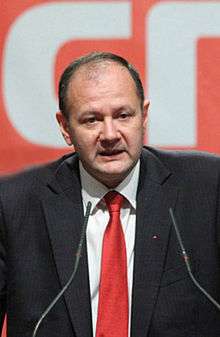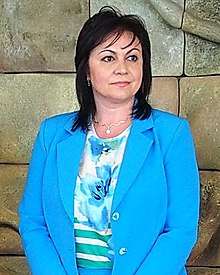Bulgarian Socialist Party
Bulgarian Socialist Party Българска социалистическа партия Bǎlgarska socialističeska partija | |
|---|---|
 | |
| Leader | Korneliya Ninova |
| Founder | Aleksandar Lilov |
| Founded |
1894 (founded) 3 April 1990 (present name) |
| Preceded by | Bulgarian Communist Party |
| Headquarters | 20 Positano Street, Sofia |
| Youth wing | Bulgarian Socialist Youth |
| Membership |
|
| Ideology |
Social democracy[1] Democratic socialism Soft euroscepticism Russophilia[2] |
| Political position | Centre-left to left-wing |
| National affiliation | Coalition for Bulgaria |
| European affiliation | Party of European Socialists |
| International affiliation | Socialist International |
| European Parliament group | Progressive Alliance of Socialists and Democrats |
| Colours | Red |
| National Assembly |
79 / 240 |
| European Parliament |
4 / 17 |
| Мunicipalities |
41 / 265 |
| Website | |
|
www | |
The Bulgarian Socialist Party (Bulgarian: Българска социалистическа партия, БСП; Bulgarska sotsialisticheska partiya, BSP), known as the Centenarian (Столетницата, Stoletnitsata),[3] is a social-democratic[1] political party in Bulgaria and the successor to the Bulgarian Communist Party. Although a member of the Party of European Socialists the party is often openly anti-EU and pro-Russian in its policies. BSP is also a member of the Socialist International. It is the leading component of the centre-left Coalition for Bulgaria.
History
The Bulgarian Socialist Party is recognized as the successor of the Bulgarian Social Democratic Workers' Party created on 2 August 1891 on Buzludzha peak by Dimitar Blagoev, designated in 1903 as the Bulgarian Social Democratic Workers' Party (Narrow Socialists) and later as the Bulgarian Communist Party.[4] The party was formed after the political changes of 1989, when the Communist Party abandoned Marxism–Leninism and refounded itself as the "Bulgarian Socialist Party" in April 1990.
The party formed a government after the Constitutional Assembly elections of 1990, but was forced to resign after a general strike that December. A non-partisan government led by Dimitar Popov took over until the next elections in October 1991. In the aftermath the party was confined to opposition. As part of the Democratic Left coalition (forerunner of the Coalition of Bulgaria), it helped form a new government in 1995, headed by BSP leader Zhan Videnov as Prime Minister. Its term ended at the end of 1996, after the country entered into a spiral of hyperinflation, the most serious economic and financial crisis in its recent history. Large-scale demonstrations in the cities and a general strike prevented the formation of a new socialist government.
In 2001, party chairman Georgi Parvanov was elected President of Bulgaria on the second round, defeating incumbent SDS candidate on the second ballot. Parvanov resigned as party chairman and was succeeded by Sergei Stanishev.
After two full terms out of power (1997–2005), the BSP and its allies in the Coalition for Bulgaria won the national elections of 2005 with 31.0% of the vote and formed a coalition government with the centrist party National Movement Simeon II and the Movement for Rights and Freedoms (DPS). The cabinet was headed by the prime minister and BSP chairman Sergei Stanishev. In 2006, Georgi Parvanov was reelected president in a landslide, becoming the first Bulgarian president to be reelected directly by the public. In 2007, Bulgaria joined the European Union. Later, the triple-coalition lost millions of Euros of European financial aid in the wake of allegations of widespread political corruption. The cabinet was also unable to react to the encroaching world economic crisis and its term ended with a budget deficit after several successive surplus years.[5]
In the 2009 parliamentary elections, the BSP was defeated by the new conservative party GERB, obtaining 37 out of 240 parliamentary seats (18%), and went into opposition.
In the 2013 parliamentary elections the party took 26.6% of the votes, second behind GERB with 30.5%. Nevertheless, the party's candidate for prime minister, Plamen Oresharski, and his proposed government were elected with the parliament support of the BSP and the DPS. The appointment of the controversial media mogul Delyan Peevski as head of the state security agency DANS, sparked large-scale protests on 14 June.[6] Demonstrations urging the government to step down continued until the government resigned in July of the following year.
Membership
The party is the largest in Bulgaria by number of members, as of 2016 having 105,000 members, down from 130,000 in 2013,[7] 150,000 in 2012, 210,000 in 2009, 250,000 in 1996 and around 1 million members during late Communist rule (1946-1990).[8][8][9]
List of chairmen
| № | Name (Birth–Death) |
Portrait | Term of office | |
|---|---|---|---|---|
| 1 | Aleksandar Lilov (1933–2013) | 3 April 1990 | 12 December 1991 | |
| 2 | Zhan Videnov (1959– ) | 12 December 1991 | 21 December 1996 | |
| 3 | Georgi Parvanov (1957–) |  | 21 December 1996 | 5 December 2001 |
| 4 | Sergei Stanishev (1966–) |  | 5 December 2001 | 27 July 2014 |
| 5 | Mihail Mikov (1960–) |  | 27 July 2014 | 8 May 2016 |
| 6 | Korneliya Ninova (1969–) |  | 8 May 2016 | Incumbent |
Electoral history
National Assembly
The following is a summary of BSP's results in legislative elections for the Bulgarian National Assembly.
| Election | In coalition with | Votes won | Percentage | Seats won | Change | Government |
|---|---|---|---|---|---|---|
| (Coalition totals) | (Coalition totals) | |||||
| 1990 | None | 2,887,766 | 47.15 (#1) | 211 / 400 |
Government | |
| 1991 | Pre-Electoral Union | 1,836,050 | 33.1 (#2) | 106 / 240 |
Opposition | |
| 1994 | Democratic Left | 2,262,943 | 43.50 (#1) | 125 / 240 |
Government | |
| 1997 | Democratic Left | 939,308 | 22.1 (#2) | 58 / 240 |
Opposition | |
| 2001 | Coalition for Bulgaria | 783,372 | 17.15 (#3) | 48 / 240 |
Opposition | |
| 2005 | Coalition for Bulgaria | 1,129,196 | 31.0 (#1) | 82 / 240 |
Government | |
| 2009 | Coalition for Bulgaria | 748,114 | 17.7 (#2) | 40 / 240 |
Opposition | |
| 2013 | Coalition for Bulgaria | 942,541 | 26.61 (#2) | 84 / 240 |
Government | |
| 2014 | BSP - Left Bulgaria | 505,527 | 15.40 (#2) | 39 / 240 |
Opposition | |
| 2017 | BSP for Bulgaria | 955,490 | 27.20 (#2) | 80 / 240 |
Opposition | |
References
- 1 2 Nordsieck, Wolfram (2017). "Bulgaria". Parties and Elections in Europe. Retrieved 5 April 2018.
- ↑ "Bulgaria: Caught Between Moscow and Brussels - Novinite.com - Sofia News Agency". novinite.com. Retrieved 5 April 2018.
- ↑ "Столетницата избра Бриго за София" [Centenarians chose Sofia Brigo] (in Bulgarian). Dnes.bg. 1 September 2007. Retrieved 23 May 2017.
- ↑ "История" (in Bulgarian). Българска социалистическа партия. Archived from the original on 29 March 2010. Retrieved 29 March 2010.
- ↑ Bulgaria: Bulgaria's Budget Deficit Tops BGN 386 M in January–July 2009 – Novinite.com – Sofia News Agency. Novinite.com (1 September 2009). Retrieved 23 October 2011.
- ↑ Bulgarians protests over media magnate as security chief, Reuters, June 14, 2013
- ↑ "Archived copy". Archived from the original on 13 March 2016. Retrieved 13 March 2016.
- 1 2 "500 000 Bulgarians are members of parties".
- ↑ "Труд". Труд.
External links
- Official website
